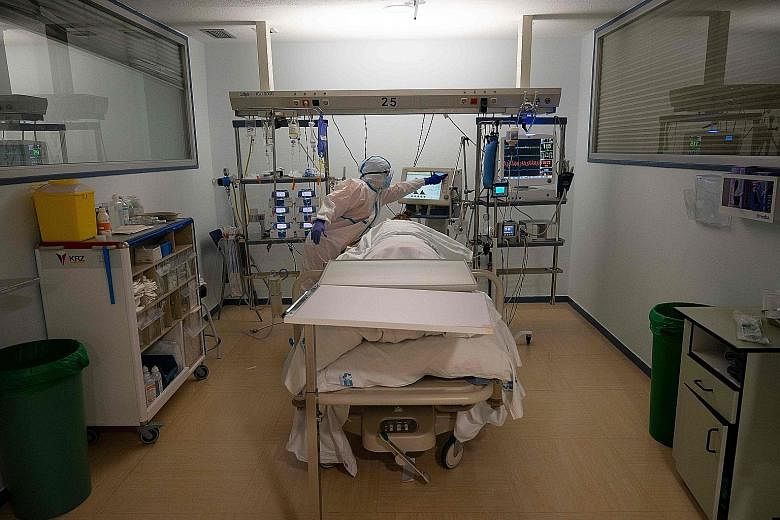MADRID • Spain needs drastic measures to combat an out-of-control new wave of the coronavirus pandemic and is considering new restrictions, including curfews, Health Minister Salvador Illa said yesterday.
Spain on Wednesday became the first country in Western Europe to have recorded more than one million cases of the virus.
"The second wave is a reality. In many areas of our country, the epidemic is out of control," Mr Illa told Onda Cero radio. "I insist we have to take drastic measures, as do several regions," he said.
A number of regions are advocating localised curfews such as those implemented in France and other European countries with lower infection rates, he said.
Desperate to avoid a repeat of the first wave, when the virus ravaged Spain's elderly population and brought the health service to its knees, several regions have already taken steps, including telling restaurants to shut down earlier than usual.
However, with a two-week lockdown of Madrid and surrounding cities coming to an end today and the contagion rates growing, more needs to be done, Mr Illa said.
"We are at the doorstep of winter, when most activities are carried out indoors, when probability of virus contagion is higher. We cannot lower our guard," he said. "The horizon we have been discussing with technicians from the ministry and European colleagues is of five to six very hard months."
While daily deaths have been hovering around 100 - a far cry from the peak of nearly 900 registered in late March - hospital admissions have jumped 20 per cent nationwide, triggering warnings that some non-urgent operations may need to be postponed.
Meanwhile, the Spanish Parliament yesterday threw out, as expected, a motion of no confidence in Socialist Prime Minister Pedro Sanchez, launched by the far-right Vox party and dismissed as a "circus show" by the main conservative opposition People's Party.
The motion was rejected by 298-52 votes. Vox, which argued that the minority leftist coalition government had botched the handling of the coronavirus pandemic, was the only party that voted for it, a day after the country's infections hit one million.
Spain, which is home to around 47 million people, is only the sixth country in the world to cross this grim milestone after the United States, India, Brazil, Russia and Argentina, according to an Agence France-Presse tally based on official figures.
The new wave of contagion has been less deadly than that in late March and April, as the median age of new infections has dropped.
Spain was one of the worst-affected countries when the coronavirus struck Europe early this year, before one of the world's most stringent lockdowns helped reduce the outbreak's spread.
But infections have surged since the lockdown measures were fully removed at the end of June, with the rise blamed on the rapid return of nightlife and a lack of an efficient system to track and trace infections.
Messy disagreements between the central and regional governments, and between political parties, over what measures to take have also hampered the response, experts say.
"The pandemic has been used as a political weapon to fight and argue with your adversaries instead of trying to find a middle ground and the best solution for everyone," health sciences expert Salvador Macip of Catalonia's Open University told AFP.
As infections picked up, the Spanish regional authorities started imposing fresh restrictions. Madrid and several satellite cities have since early this month been under a partial lockdown, while the wealthy north-eastern region of Catalonia has imposed a 15-day shutdown of all bars and restaurants.
The northern wine-growing region of La Rioja announced on Wednesday that it would close its regional borders, while the north-eastern region of Aragon said it would impose a partial lockdown on its three biggest cities - Huesca, Teruel and Zaragoza.
Dr Angela Hernandez Puente, who is the deputy secretary of Madrid's Amtys medical association, said the situation was very worrying, but not comparable with the overwhelming pressure that the health system came under in March when intensive care units were full and staff lacked personal protective equipment.
But she said the gains of Spain's tough lockdown were wasted due to a lack of preparation for a second wave of infections, citing as an example the failure to hire more doctors for public primary care centres, the first line of defence against the virus as they handle testing and tracing potential cases as well as treating the sick.
"Healthcare staff are tired and angry, many doctors feel that more should have been done in June, July and August to not let the public health system become overburdened as it is now," she told AFP.
REUTERS, AGENCE FRANCE-PRESSE











